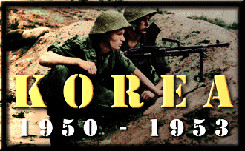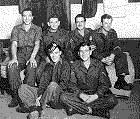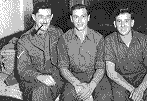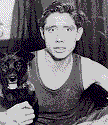'Charlie Chinaman's Gunpowder Plot'
By Bill Ballinger Kings Own Scottish Borderers
Poem written by
Pte. Bill Dalziel MM.
Take me out of this place called korea
Take me back where my old folks remain
Take me back to civilization
And let me live once again
Now there was a hill 317
Where most of the fighting was done
Twas there that the gallant borderers
They fought as second to none
Now the Austrailans they fought like devils
And the kislies did well I agree
But give me the lads of the tartan trews
The lads of the kosb
Now all these young lads came from Scotland
The land where the fighting men dwell
And these were the lads that made the chinks run
And they ran like the hammers of hell
I was 17 when I finished basic training in the Royal Scots at Dreghorn Barracks in Edinburgh. After a short stint as regimental butcher, three buddies and I volunteered for Korea. We were then sent either to Fort George or Fort William (can't remember) and were transferred to the Argyle & Sutherland Highlanders where we did further training before being sent to Korea. We left Southampton, in England, in April of 1951 after stops along the way to take on water & provisions. When we stopped at various ports we had 1, 2, or 3 days shore leave. I remember Port Said where I had my first Coca Cola, a camel ride, and some wonderful sights. Then down the Suez Canal to Port Suez and out into the Indian Ocean.
I am not sure if the next stops are in proper order but here goes. Aden, an RAF base where they fed us and we had a good time, Singapore, where I got drunk for my first time and at that time said it would be my last. I think the next stop was Hong Kong. It was too shallow to dock at a pier so we tied up in the harbour and were taken in by ferryboat. We arrived in the harbour at night and what a sight it was. The lights on the hills of Hong Kong were sparkling like a Christmas tree and hundreds of boats, of all shapes and sizes, all lit up it is something I will never forget.
The next morning after breakfast we went up on deck and were treated to a wonderful sight. Down on the water were dozens of boats with people shouting up at us to buy wallets, handbags, ornaments, and Spanish fly (what ever that is). We had to throw a rope over the side with the money tied to it and they would send up the article you had haggled for (Ha Ha). After a half hour of fun we got the ferryboats into Hong Kong. You can imagine how impressive the sights were to 17 year olds away from home for the first time - so much to see and so little time to see it in.
After some time spent sightseeing we had to spend some time in other delights, so we did. Again after drinking too much we were heading back to the ship when we were stopped by the MPs who took us back to the dock where we were met by an officer who informed us that all National Service men were being transferred to the next regiment in the ship behind us, which was the KOSB as the Argyles' tour of duty was finished in Korea.
If I had been a regular soldier instead of National Service I would have stayed in Hong Kong and gone back home with the Argyles. Not bad - three regiments in one year. Instead I stayed in HK for 2 or 3 days and joined the next regiment. The next leg of our journey we stopped in Colombo. After our shore leave we took a rickshaw loaded with fruit, some we had never seen before, back to the ship. Once on deck we proceeded to pig out and with the juices running down our chins we had one hell of a good time. I am probably missing a few ports of call but the 6 weeks I spent on the ship were some of the best times of my life.
I think our ship docked in Pusan. I seem to remember being in an American camp waiting for transportation to Kure. Some American soldiers came over to speak to me and some of my buddies about where we were from in Scotland and how some of them had visited there and how they had enjoyed it. They then asked why we were not going to the canteen for a beer and I explained that we just had British money and it had not been changed to script yet so he called some of his buddies over and explained and took up a collection so that we could buy a beer. The camp in Kure was called JRBD (Japan Reinforcement Base Depot). About all I remember about it was that it had a large mess hall and a swimming pool outdoors with a village a few miles away that we could visit for a beer and a few other local treats.

The village had no sewer system. The ditch through it carried all the human waste and a man with a cart and a pole on his shoulder, with two buckets attached used to deliver it to the paddy fields (I hope you all enjoyed rice). During my stay at Kure and before being sent up the line. I had the opportunity to visit Hiroshima & Nagasaki, where they dropped the atomic bombs, and at that time not a lot of it had been rebuilt. When it came time to go up the line I remember that it was night and when we got off the trucks we had to move up the hill to our positions in single file. Please don't ask me the name or number of the hill, as I don't remember.

When we got up the hill we were told to dig in and make the trenches deep. The next morning, when we could see, we realized how close we were to the enemy when we could see them in their positions. We saw no action for the first few days and could wander about our position as long as we stayed on the backside of the hill. Near our positions we saw some mounds and discovered that they were Korean graves, and we found out one day after some very heavy rain that they were not buried very deep.
At night we had to go on patrols in front of our positions and through no man's land all very scared and not very sure of what we were going to find. After a while we kind of got used to it. At night in our trenches, two men to a trench, we had to do guard duty 2 hrs. on, 2hrs off. At night the terrain in front of you is not the same as it looked in the daytime and bushes suddenly look like people. We wasted a few bullets shooting at nothing but fortunately we had a good sergeant, Ken Gauntlet, who soon got us straightened out and helped keep us calm.
One night we went down the front of our hill to lay out some barbed wire to hinder the enemy if they attacked. We thought it would be a good idea to bend the lids on some cans and hang them on the wire with some small stones in them so they rattled when the wire was moved. Bad idea! The next night the wind came up and we had a hell of a battle with nobody, flare guns going off, machine guns and rifles being fired but I guess you learn from your mistakes. The next hill we were on was called 317. After being on it for a few days, one night we were attacked by thousands of Chinese who came in waves up the hill at us. The first wave had no weapons and they just threw themselves on the barbed wire so that the next wave could run over them. They had one burp (machine) gun between two men and one carried the gun while the other carried the ammunition. The next wave was the crack troops who were supposed to over run us. After a very fierce fight they did.
That was when the newspapers called it 'Charlie Chinaman's Gunpowder Plot' and the night Bill Speakman got the VC. It was also when Jimmy Burgess threw the beer bottles at the enemy when we ran out of ammunition. I was a Bren gunner in that action and lost my number 2 man, who carried my spare parts and spare ammo, as well as his rifle. Most of the rest of that night is just a blur. I spent a few nights in an Indian field ambulance hospital and went back to Kure before being shipped home.
Bill Ballinger
June 2002










